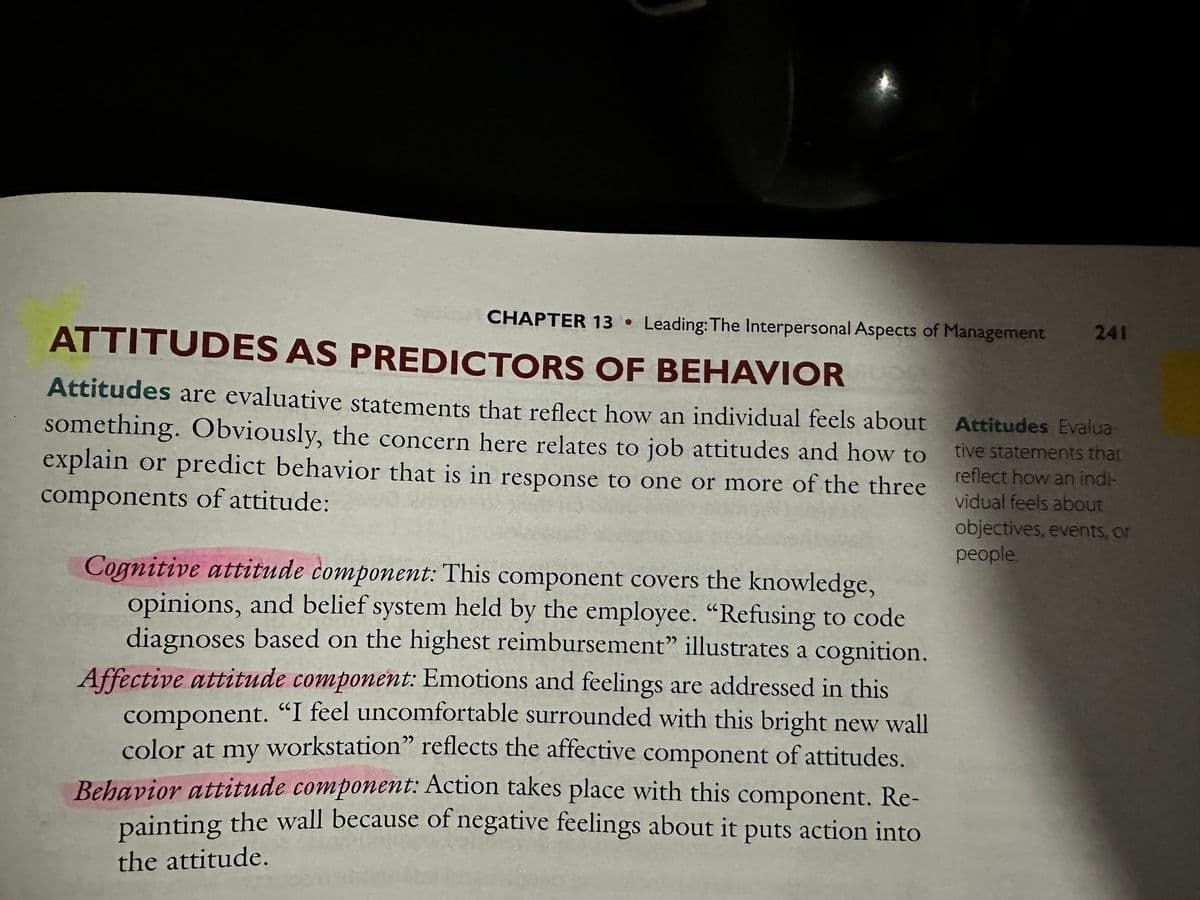Attitudes are evaluative statements that reflect how an individual feels about something. Obviously, the concern here relates to job attitudes and how to explain or predict behavior that is in response to one or more of the three components of attitude: Cognitive attitude component: This component covers the knowledge, opinions, and belief system held by the employee. "Refusing to code diagnoses based on the highest reimbursement" illustrates a cognition. Affective attitude component: Emotions and feelings are addressed in this component. "I feel uncomfortable surrounded with this bright new wall color at my workstation" reflects the affective component of attitudes. Behavior attitude component: Action takes place with this component. Re- painting the wall because of negative feelings about it puts action into the attitude. Attitudes Evalua- tive statements that reflect how an indl- vidual feels about objectives, events, or people
Attitudes are evaluative statements that reflect how an individual feels about something. Obviously, the concern here relates to job attitudes and how to explain or predict behavior that is in response to one or more of the three components of attitude: Cognitive attitude component: This component covers the knowledge, opinions, and belief system held by the employee. "Refusing to code diagnoses based on the highest reimbursement" illustrates a cognition. Affective attitude component: Emotions and feelings are addressed in this component. "I feel uncomfortable surrounded with this bright new wall color at my workstation" reflects the affective component of attitudes. Behavior attitude component: Action takes place with this component. Re- painting the wall because of negative feelings about it puts action into the attitude. Attitudes Evalua- tive statements that reflect how an indl- vidual feels about objectives, events, or people
Management, Loose-Leaf Version
13th Edition
ISBN:9781305969308
Author:Richard L. Daft
Publisher:Richard L. Daft
Chapter14: Understanding Individual Behavior
Section: Chapter Questions
Problem 3ED
Related questions
Question
Please help me answer this question in detail.
Question: Access the attitudes of the employees you have observed recently and categorize them into three attitudes as predictions of behavior and provide one example of your own for each of the attitudes as predictions of behavior.
These examples must be healthcare employees. Please explain in detail
Please note that this example should not be the same as in the definition above.

Transcribed Image Text:CHAPTER 13. Leading: The Interpersonal Aspects of Management 241
ATTITUDES AS PREDICTORS OF BEHAVIOR
Attitudes are evaluative statements that reflect how an individual feels about
something. Obviously, the concern here relates to job attitudes and how to
explain or predict behavior that is in response to one or more of the three
components of attitude:
Cognitive attitude component: This component covers the knowledge,
opinions, and belief system held by the employee. "Refusing to code
diagnoses based on the highest reimbursement" illustrates a cognition.
Affective attitude component: Emotions and feelings are addressed in this
component. "I feel uncomfortable surrounded with this bright new wall
color at my workstation" reflects the affective component of attitudes.
Behavior attitude component: Action takes place with this component. Re-
painting the wall because of negative feelings about it puts action into
the attitude.
Attitudes Evalua-
tive statements that
reflect how an indl-
vidual feels about
objectives, events, or
people.
Expert Solution
This question has been solved!
Explore an expertly crafted, step-by-step solution for a thorough understanding of key concepts.
Step by step
Solved in 2 steps

Recommended textbooks for you

Management, Loose-Leaf Version
Management
ISBN:
9781305969308
Author:
Richard L. Daft
Publisher:
South-Western College Pub

Management, Loose-Leaf Version
Management
ISBN:
9781305969308
Author:
Richard L. Daft
Publisher:
South-Western College Pub